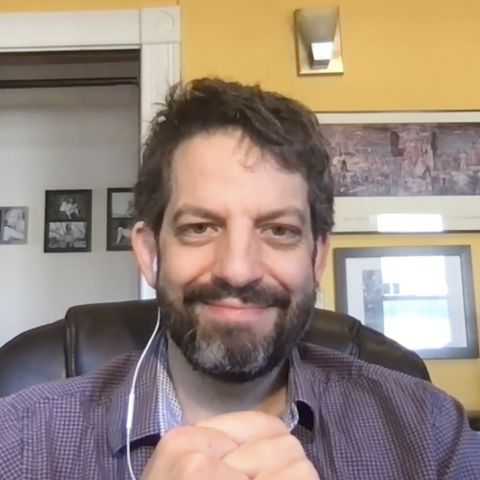Fixing the Electoral College: The National Popular Vote Initiative

Descarga y escucha en cualquier lugar
Descarga tus episodios favoritos y disfrútalos, ¡dondequiera que estés! Regístrate o inicia sesión ahora para acceder a la escucha sin conexión.
Descripción
Our guest today is Christopher Pearson and the topic is passing the National Popular Vote bill that would guarantee the presidency to the candidate with the most popular votes. Pearson...
mostra másWe’ve all seen the problems with the current Electoral College system, made even worse with the Donald Trump’s shenanigans to use it to retain power, despite his election defeat. And, in 2020, while Joe Biden won by more than 7 million votes, because of the Electoral College, a switch of only 23,000 votes in three states could have given the election to Trump.
“That’s dangerous. That’s a real threat to our whole system,” says Pearson on the podcast.
The National Popular Vote Interstate Compact, if passed by enough states, would guarantee the Presidency to the candidate who receives the most popular votes across all 50 states and the District of Columbia. The Compact ensures that every vote, in every state, will matter in every presidential election. It is a state-based approach that preserves the Electoral College, state control of elections, and the power of the states to control how the President is elected.
The National Popular Vote bill has been enacted by 16 jurisdictions possessing 195 electoral votes, including four small states (DE, HI, RI, VT), eight medium-sized states (CO, CT, MD, MA, NJ, NM, OR, WA), three big states (CA, IL, NY), and the District of Columbia. The bill, which will take effect when enacted by states with 75 more electoral votes, has passed at least one chamber in nine additional states with 88 more electoral votes (AR, AZ, ME, MI, MN, NC, NV, OK, VA). A total of 3,522 state legislators from all 50 states have endorsed it.
The shortcomings of the current system of electing the President stem from “winner-take-all” laws that have been enacted by state legislatures in 48 states. These laws award all of a state’s electoral votes to the candidate receiving the most popular votes in each state.
Because of these state winner-take-all statutes, presidential candidates have no reason to pay attention to the issues of concern to voters in states where the statewide outcome is a foregone conclusion. In 2012, all of the 253 general-election campaign events were in just 12 states, and two-thirds were in just four (Ohio, Florida, Virginia, and Iowa). Thirty-eight states were ignored.
“In politics, what matters is influence,” says Pearson. “Where you get influence in the current system of electing a president is not be being a small state, not by being a big state, it’s by being a battleground state. If you look at where they spend money in a campaign, in a general election, they spend over two-thirds of their resources, money and time, in usually eight states. In fact, in 2012, it was four states.” The rest of the country is “completely taken for granted,” Pearson contends, while the issues that are important to voters in those toss-up battleground states “take on huge influence in the country.”
The National Popular Vote interstate compact will go into effect when enacted by states possessing a majority of the electoral votes—that is, enough to elect a President (270 of 538). At that time, every voter in the country will acquire a direct vote for a group of at least 270 presidential electors supporting their choice for President. All of this group of 270+ presidential electors will be supporters of the candidate who received the most popular votes in all 50 states and DC—thus making that candidate President.
In contrast, under the current system, a voter has a direct voice in electing only the small number of presidential electors to which their state is entitled. Under NPV, every voter directly elects 270+ electors, Pearson explains on the podcast.
“National Popular Vote is a key reform to the way we elect a president,” Pearson says. “For people that believe every vote should be equal, if you get the most votes, you should win the election and the candidates should be inspired to go everywhere and see voters, not just a handful of battleground states. That’s what National Popular Vote’s doing, we’re over 70 percent of the way there and it’s a very exciting and important reform.”
Información
| Autor | Bob Gatty |
| Organización | Bob Gatty |
| Página web | - |
| Etiquetas |
Copyright 2024 - Spreaker Inc. an iHeartMedia Company
